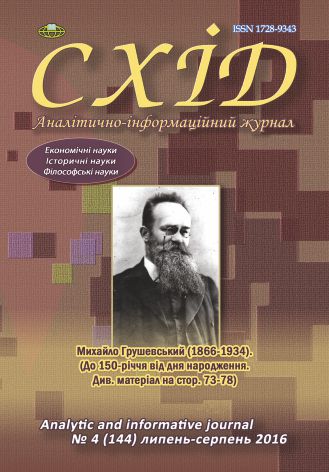Yepyfanii Slavynetskyi's views on state
DOI:
https://doi.org/10.21847/1728-9343.2016.4(144).78078Keywords:
Yepyfanii Slavynetskyi, Ukrainian Orthodox Church, the early modern Ukrainian nationAbstract
The article is devoted to the analysis of representations of the state which were part of the philosophical concept of the famous Ukrainian church leader, educator, philologist Yepyfanii Slavynetskyi. It was found that the historical and cultural context in which these views were formed, included deep familiarity with European philosophy, the theory of the state developed by the Orthodox intellectuals of Kyiv-Mohyla Collegium, the political struggle for the incipience of early modern Ukrainian nation in the second half of the XVII century. Noted significant influence of the philosophy of E. Slavynetskyi on the religious, cultural and educational processes in Muscovy in era of Patriarch Nikon's reforms. The presence of the Patriarch own notions of state authority actively influence on the formation of the E. Slavinetsky's concept too.
It is noted that E. Slavynetskyi's statesmanship theory was based on the developed by the Ukrainian Orthodox intellectuals of the end of XVI - first half XVII theory of the ideal state, which in the second half of the XVII century actively evolved due to the political union of the The Cossack Hetmanate and Moscow. Accordingly, E. Slavynetskyi recognized people's right to political activity and state power, the church was considered as a leader of social progress, obligement of the lord to care for the public good. It was found that the concept of E. Slavynetskyi's state have many elements of European theories of enlightened absolutism. Yes, he acknowledges that the foundation of the state is public good and providing the best way for implementation this good - monarchy, insisted on the absolute power of the monarch. The relationship between the church and secular authorities philosopher solves unambiguously in favor of a secular, acknowledging the king's right to decide all important issues of church life.
It is noted that the main reason for the evolution of such ideas was given the fact of The Cossack Hetmanate's political union with Russia as the civilizational mission to improve the capacity of the Orthodox culture and building a just state. This theory has become its logical conclusion later in the XVIII century in F. Prokopovich's philosophical views and political activities.Downloads
References
Bulgakov, M. (2012), History of the Russian church, part 1, Publishing House of The Valaam Monastery, Moscow, 1341 p. (rus).
2. Golubev, S. (1883), Metropolitan of Kiev Petro Mohyla and his associates, Vol. 2, Typography of the G.T. Korczak-Novytskyi, Kyiv, 524 p. (rus).
3. Case of Patriarch Nikon (1897), Publication of The Archaeographic Commission on documents Moscow Synodal (former Patriarchal) Library, St.Petersburg, 474 p. (rus).
4. Kagamlyk, S. (2014), Activity of the Ukrainian church elite early modern time as a civilizational factor in the development of the Russian Empire, Ukrainian almanakh, Vol. 17, 77-80 (ukr).
5. Kiselev, M.A. (2013), The form of government and state hierarchy in the Russian political thought of the XVII century - the first quarter XVIII century, Historic Gazette, Vol. 6 (153), 18-53 (rus).
6. Lobachev, S.V. (2003), Patriarch Nikon, Iskusstvo Publishing, St. Petersburg, 416 p. (rus).
7. Pevnytskyi, V.F. (1861), Yepyfanii Slavynetskyi - one of the main figures of Russian religious literature in the XVII century, Works of the Kievan Theological Academy, № 8, 405-438; № 9, 135-182 (rus).
8. Plokhii, S. (2006), Nalyvaiko’s faith, Cossacks and religion in early modern Ukraine, Krytyka, Kyiv, 495 p. (ukr).
9. Rotar, I. (1900), Yepyfanii Slavynetskyi - literary figure of the XVII century, Kiyevskaya Starina, Vol. 71, 1-38 (rus).
10. Rumyantseva, V. (2012), Yepyfanii Slavynetskyi in Moscow, in: Orthodoxy in Ukraine and Muscovy XV-XVII centuries: the general and the various, Indrik Publishing, Moscow, 278-289 (rus).
11. Undolskyi, V.M. (1846), Scientific works of the Yepyfanii (Slavynetskyi), Readings at the Imperial community of Russian History and Antiquities, № 4, 69-72 (rus).
Downloads
Published
How to Cite
Issue
Section
License
Copyright (c) 2016 Nataliia Shalashna

This work is licensed under a Creative Commons Attribution-NonCommercial-NoDerivatives 4.0 International License.
1. Authors bear responsibility for the accuracy of facts, quotations, numbers and names used.
2. Manuscripts are not sent back.
3. The publisher does not always agree with the authors' opinion.
4. The authors reserve the right to authorship of the work and pass the first publication right of this work to the journal under the terms of a Creative Commons Attribution-NonCommercial-NoDerivatives 4.0 International License. This license allows others to distribute (copy) the published work for non-commercial purposes, provided there is mandatory attribution to its authors and a link to the first publication in our journal.
5. The authors have the right to conclude separate supplement agreements that relate to non-exclusive work distribution in the form in which it has been published by the journal (for example, to upload the work to the online storage of the journal or publish it as part of a monograph), provided that the reference to the first publication of the work in this journal is included.

